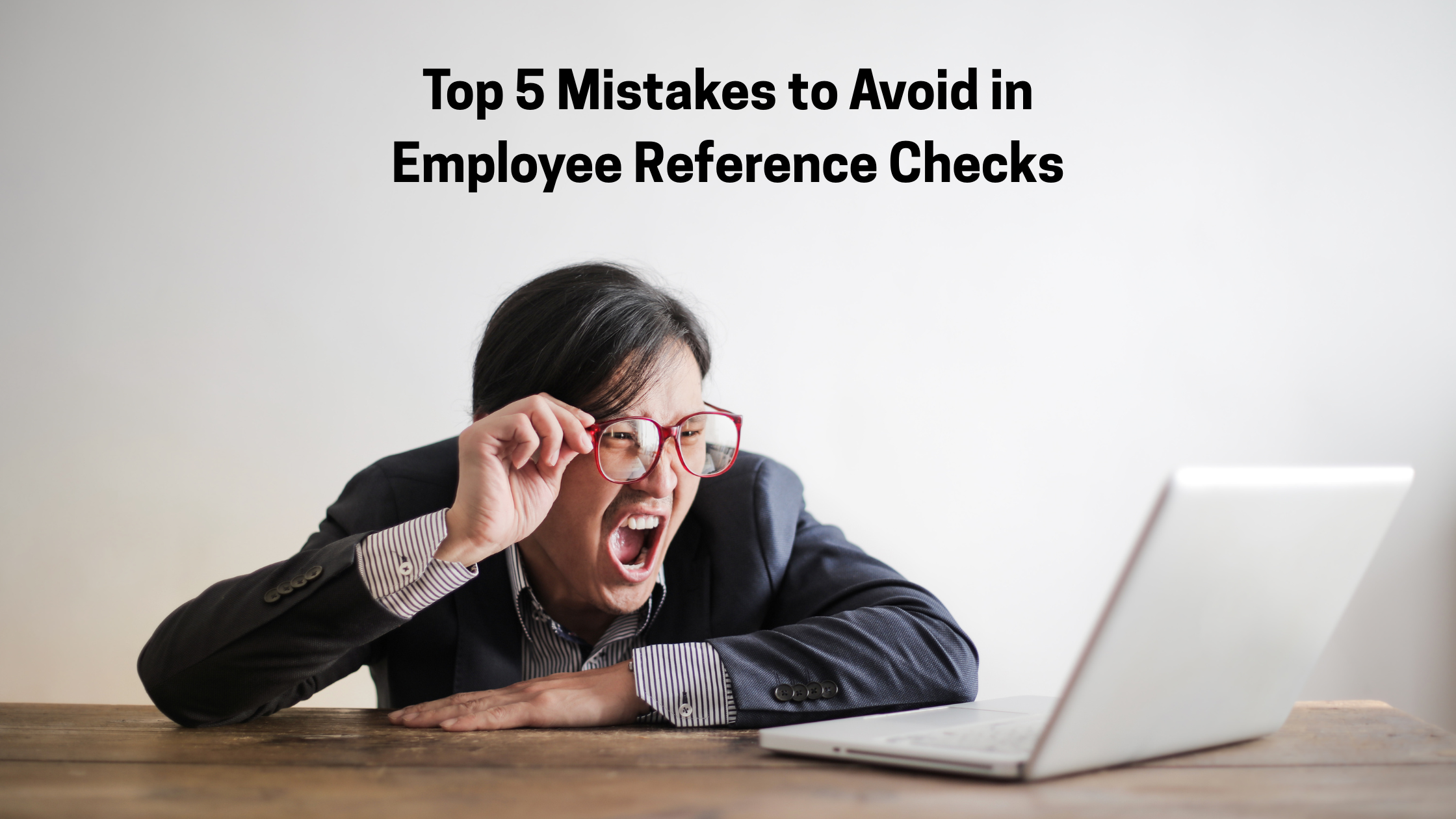Hiring the right talent is one of the most important decisions a company makes. And while resumes, interviews, and technical assessments offer valuable insights, employee reference checks remain one of the most underutilized and often mishandled tools in the recruitment process.
When conducted properly, reference checks can uncover critical details about a candidate’s work ethic, cultural fit, past performance, and behavior. However, when done poorly, they become nothing more than a formality—wasting time and leaving companies vulnerable to hiring mistakes.
In this article, we highlight the top 5 mistakes to avoid during employee reference checks and how your organization can get the most value from this crucial hiring step.
Mistake 1: Treating Reference Checks as a Mere Formality
Many HR teams or hiring managers treat reference checks as just another item to check off before making an offer. They make quick calls, ask vague questions, and fail to probe for deeper insights.
Why it matters:
Rushed or superficial reference checks often result in generic answers like “Yes, he worked here,” or “She was fine.” These don’t offer actionable insights or help you make better hiring decisions.
How to avoid it:
- Prepare a set of structured, open-ended questions tailored to the job role.
- Go beyond dates and designations—ask about performance, attitude, leadership, collaboration, and response to feedback.
- Use behavioral-based questioning techniques for richer insights.
Mistake 2: Contacting the Wrong References
One of the biggest errors companies make is accepting references provided only by the candidate without verifying their relevance. Often, candidates list friendly peers or non-supervisory colleagues who are more likely to give positive but biased feedback.
Why it matters:
You may get incomplete or inaccurate insights if the reference hasn’t directly supervised or worked closely with the candidate in a relevant context.
How to avoid it:
- Always request professional references from direct managers, team leads, or HR from previous employers.
- Validate that the reference had enough interaction with the candidate to provide meaningful feedback.
- Use third-party background verification partners like Dcode Research who can independently identify and verify reference contacts.
Mistake 3: Asking Leading or Yes/No Questions
Another common mistake is asking leading questions or yes/no questions like:
- “She was punctual, right?”
- “Would you rehire him?”
- “Was he good at communication?”
Why it matters:
These types of questions limit the depth of responses and often lead to diplomatic or non-informative answers. You might miss red flags or overlook important strengths.
How to avoid it:
Ask open-ended, non-leading questions such as:
- “Can you describe how the candidate handled team conflicts or disagreements?”
- “Tell me about a challenging project they worked on. What role did they play?”
- “How did they take feedback and incorporate it into their work?”
This encourages the reference to share detailed, specific, and honest feedback.
Mistake 4: Ignoring Tone and Context in Responses
Sometimes, what’s not said is just as important as what is said. Many hiring managers fail to pay attention to the tone, hesitation, or vagueness in a reference’s responses. They also overlook the context—such as company culture or internal dynamics at the time.
Why it matters:
Subtle clues—like long pauses, avoidance, or lukewarm praise—could be signaling a concern that isn’t stated directly. Without context, it’s easy to misinterpret feedback.
How to avoid it:
- Be attentive to the reference’s tone, choice of words, and willingness to provide examples.
- Ask clarifying questions when answers seem vague or hesitant.
- Consider using experienced professionals like Dcode Research who are trained in interpreting reference feedback with the right mix of objectivity and empathy.
Mistake 5: Failing to Document and Standardize the Process
Many companies don’t have a consistent process for conducting and documenting reference checks. Each hiring manager might handle it differently, resulting in inconsistent data quality and decision-making.
Why it matters:
Without standardization, important insights may be lost, overlooked, or difficult to compare. It also increases the risk of non-compliance with hiring regulations and internal audit requirements.
How to avoid it:
- Develop a structured reference check form or template.
- Include key evaluation parameters such as punctuality, performance, attitude, leadership, and communication.
- Maintain secure records of all reference communications.
- Outsource the process to a reliable background verification company to ensure accuracy, consistency, and legal compliance.
“Bonus Tip: Don’t Delay the Reference Check Until the Final Stage”
Many companies wait until the offer stage to conduct reference checks. This can delay hiring if red flags emerge late in the process, and may put pressure on decision-makers to ignore concerns just to close the hire.
Instead, initiate the reference check before the final interview or in parallel with it. That way, you can make a fully informed decision, with data from interviews and references available at the same time.
Why Choose Dcode Research for Employee Reference Checks?
At Dcode Research, we specialize in employee background verification and reference checks tailored for diverse industries—from IT and finance to retail and healthcare. We help employers:
- Access verified professional references
- Conduct structured, in-depth reference interviews
- Identify red flags and strengths with clear documentation
- Ensure compliance with data privacy and HR regulations
- Make faster and smarter hiring decisions
As one of the trusted background verification companies in Bangalore, we bring local expertise, nationwide reach, and fast turnaround times.
Final Thoughts
Employee reference checks are more than just a formality—they’re a powerful decision-making tool when done right. By avoiding these five common mistakes, you can significantly improve the quality of your hires, reduce turnover, and build a more dependable workforce.
Don’t leave hiring to chance. Let professionals help you conduct thorough, unbiased, and insightful reference checks.
✅ Ready to streamline your hiring with expert reference checks?
Visit www.dcoderesearch.com to get started.
Empower your HR team with verified insights and hire with confidence.
